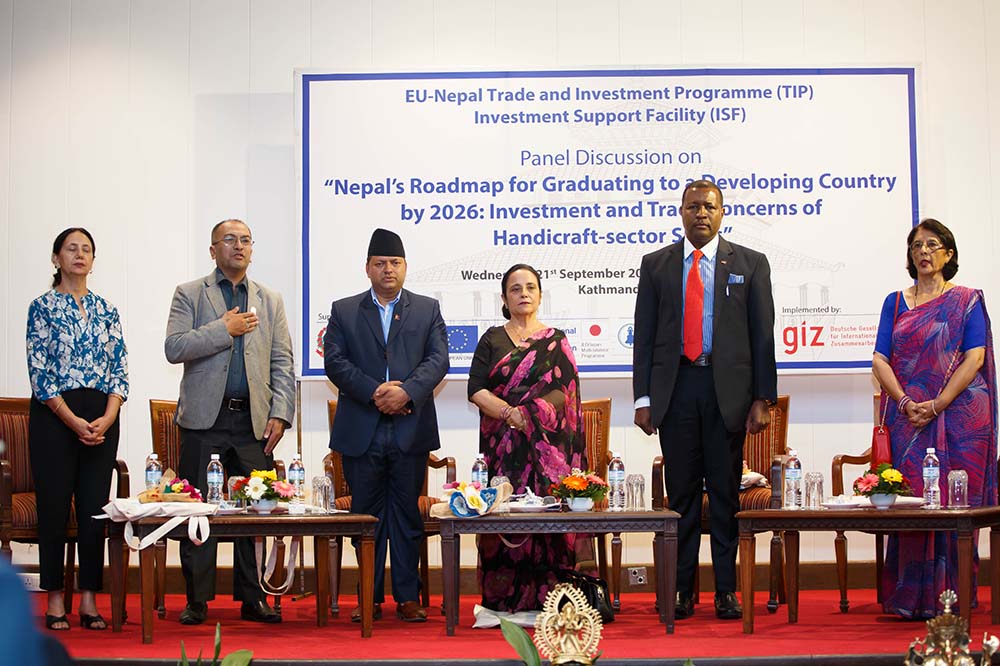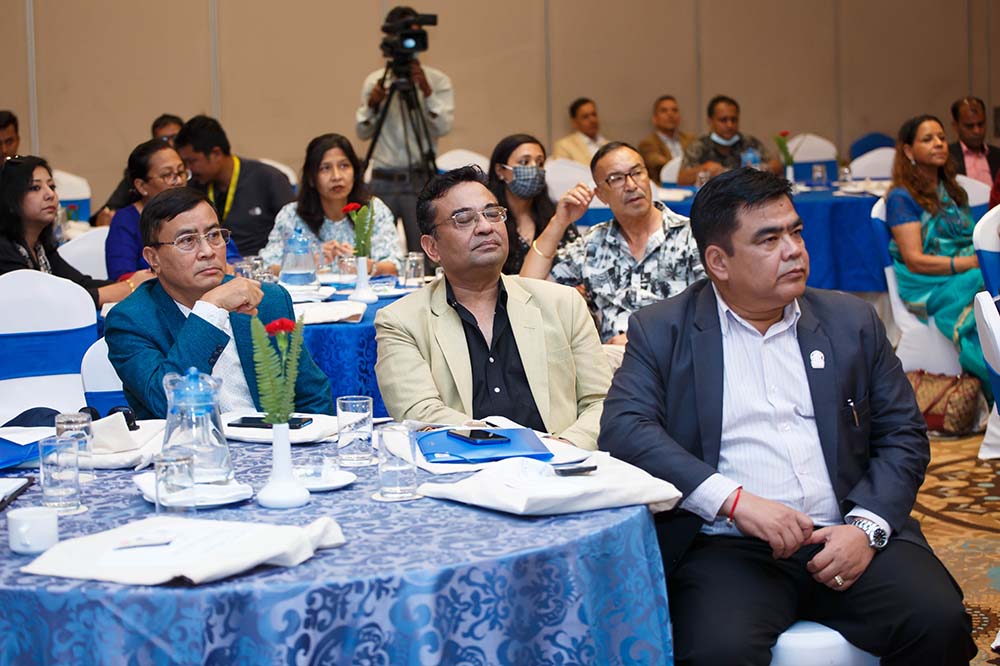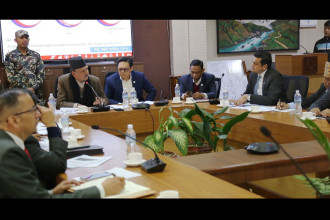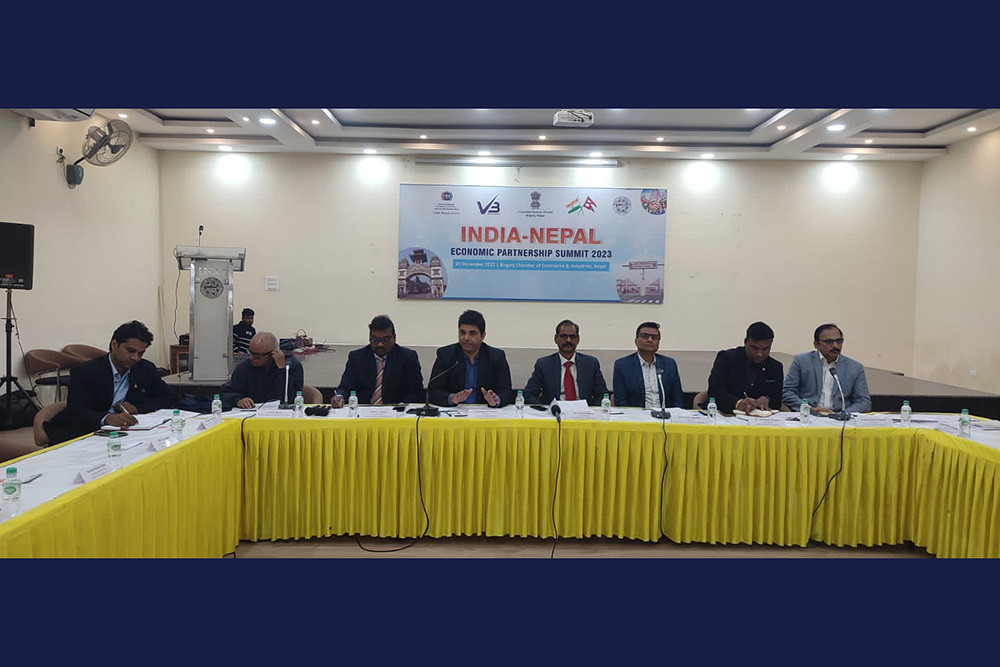
KATHMANDU: Nepal Handicraft Entrepreneur Association Kathmandu organised an interaction programme on 'Nepal's Roadmap for Graduating to a Developing Country by 2026: Investment and Trade Concerns of Handicraft-sector SMEs', on Wednesday.
The event was supported by the Ministry of Industry, Commerce and Supplies, EU Nepal Trade and Investment Programme (EU, GIZ), International Labour Organisation (ILO) and ILO Japan Multi-bilateral Programme.
[gallery columns="1" link="file" size="full" ids="29013,29009"]
Chief Guest for the event was Dr Ram Kumar Phuyal, Member of National Planning Commission. During his address, Dr Phuyal said such types of interactions are important because it not only makes stakeholders aware of the challenges and opportunities once Nepal graduates but also provides a platform to hold discussions on ways to overcome challenges and tap opportunities. He also mentioned that each individual needs to personally take responsibility for such issues.
Dr Phuyal further stated that the government is committed to making sure that the country graduates to a developing country status in a proper manner. He added that the country has been facing problems on a regular basis since the earthquake of 2015 with Covid in between and now dengue. During the pandemic the government was not able to do much on the economic front because it was more concerned with saving lives but now the government has started various exercises to help the economy, he shared.
 Meanwhile, Meera Bhattarai, President of Nepal Handicraft Entrepreneur Association Kathmandu, during her welcome address mentioned that the event was held to get feedback on suggestions so that all concerned stakeholders are well prepared for the country's graduation. When Nepal graduates in 2026 there will be many opportunities for the country but at the same time there will also be challenges, she stated. Since the country will lose the preferential treatment it has been enjoying on exports she mentioned that the government will have to introduce policies to help sectors that will be hit.
Likewise, Prachanda Shakya, President, Federation of Handicraft Associations of Nepal, also reiterated that the country will have to be prepared to overcome the challenges and maximise the opportunities once the country graduates. As the country will not be accorded concessional facilities innovative ways need to be devised to deal with that because domestic products will lose its competitive advantage, he said, adding that since local products will be competing with international products the country will have to up its game.
Meanwhile, Meera Bhattarai, President of Nepal Handicraft Entrepreneur Association Kathmandu, during her welcome address mentioned that the event was held to get feedback on suggestions so that all concerned stakeholders are well prepared for the country's graduation. When Nepal graduates in 2026 there will be many opportunities for the country but at the same time there will also be challenges, she stated. Since the country will lose the preferential treatment it has been enjoying on exports she mentioned that the government will have to introduce policies to help sectors that will be hit.
Likewise, Prachanda Shakya, President, Federation of Handicraft Associations of Nepal, also reiterated that the country will have to be prepared to overcome the challenges and maximise the opportunities once the country graduates. As the country will not be accorded concessional facilities innovative ways need to be devised to deal with that because domestic products will lose its competitive advantage, he said, adding that since local products will be competing with international products the country will have to up its game.
 Nita Neupane, Senior Programme Officer, ILO-Nepal, said the handicraft sector needs to be preserved because it has a significant contribution to the economy and also in employment generation. She mentioned that the handicraft sector contributes around Rs 20 billion annually to the country's economy but we have not tapped the opportunities to further develop the sector. She added that the handicraft sector provides employment to vulnerable members of society and that is why it is a very important sector.
Likewise, Dr Claudius Preville, Team Leader, EU-Nepal Trade and Investment Programme, stated that there will be challenges when Nepal graduates but it is a good thing for the country as it will mean that Nepal is on the right track to social and economic development. He mentioned that policies should be introduced in such a way that more women can be involved in the sector as it will help empower them. He also stressed the need to attract more foreign investment in Nepal. The other worrying concern he mentioned was that e-commerce has been gradually rising in the country but handicraft entrepreneurs seem to be lagging behind on this aspect and it was time to address this issue in a more meaningful manner.
READ ALSO:
Nita Neupane, Senior Programme Officer, ILO-Nepal, said the handicraft sector needs to be preserved because it has a significant contribution to the economy and also in employment generation. She mentioned that the handicraft sector contributes around Rs 20 billion annually to the country's economy but we have not tapped the opportunities to further develop the sector. She added that the handicraft sector provides employment to vulnerable members of society and that is why it is a very important sector.
Likewise, Dr Claudius Preville, Team Leader, EU-Nepal Trade and Investment Programme, stated that there will be challenges when Nepal graduates but it is a good thing for the country as it will mean that Nepal is on the right track to social and economic development. He mentioned that policies should be introduced in such a way that more women can be involved in the sector as it will help empower them. He also stressed the need to attract more foreign investment in Nepal. The other worrying concern he mentioned was that e-commerce has been gradually rising in the country but handicraft entrepreneurs seem to be lagging behind on this aspect and it was time to address this issue in a more meaningful manner.
READ ALSO:
 Meanwhile, Meera Bhattarai, President of Nepal Handicraft Entrepreneur Association Kathmandu, during her welcome address mentioned that the event was held to get feedback on suggestions so that all concerned stakeholders are well prepared for the country's graduation. When Nepal graduates in 2026 there will be many opportunities for the country but at the same time there will also be challenges, she stated. Since the country will lose the preferential treatment it has been enjoying on exports she mentioned that the government will have to introduce policies to help sectors that will be hit.
Likewise, Prachanda Shakya, President, Federation of Handicraft Associations of Nepal, also reiterated that the country will have to be prepared to overcome the challenges and maximise the opportunities once the country graduates. As the country will not be accorded concessional facilities innovative ways need to be devised to deal with that because domestic products will lose its competitive advantage, he said, adding that since local products will be competing with international products the country will have to up its game.
Meanwhile, Meera Bhattarai, President of Nepal Handicraft Entrepreneur Association Kathmandu, during her welcome address mentioned that the event was held to get feedback on suggestions so that all concerned stakeholders are well prepared for the country's graduation. When Nepal graduates in 2026 there will be many opportunities for the country but at the same time there will also be challenges, she stated. Since the country will lose the preferential treatment it has been enjoying on exports she mentioned that the government will have to introduce policies to help sectors that will be hit.
Likewise, Prachanda Shakya, President, Federation of Handicraft Associations of Nepal, also reiterated that the country will have to be prepared to overcome the challenges and maximise the opportunities once the country graduates. As the country will not be accorded concessional facilities innovative ways need to be devised to deal with that because domestic products will lose its competitive advantage, he said, adding that since local products will be competing with international products the country will have to up its game.
 Nita Neupane, Senior Programme Officer, ILO-Nepal, said the handicraft sector needs to be preserved because it has a significant contribution to the economy and also in employment generation. She mentioned that the handicraft sector contributes around Rs 20 billion annually to the country's economy but we have not tapped the opportunities to further develop the sector. She added that the handicraft sector provides employment to vulnerable members of society and that is why it is a very important sector.
Likewise, Dr Claudius Preville, Team Leader, EU-Nepal Trade and Investment Programme, stated that there will be challenges when Nepal graduates but it is a good thing for the country as it will mean that Nepal is on the right track to social and economic development. He mentioned that policies should be introduced in such a way that more women can be involved in the sector as it will help empower them. He also stressed the need to attract more foreign investment in Nepal. The other worrying concern he mentioned was that e-commerce has been gradually rising in the country but handicraft entrepreneurs seem to be lagging behind on this aspect and it was time to address this issue in a more meaningful manner.
READ ALSO:
Nita Neupane, Senior Programme Officer, ILO-Nepal, said the handicraft sector needs to be preserved because it has a significant contribution to the economy and also in employment generation. She mentioned that the handicraft sector contributes around Rs 20 billion annually to the country's economy but we have not tapped the opportunities to further develop the sector. She added that the handicraft sector provides employment to vulnerable members of society and that is why it is a very important sector.
Likewise, Dr Claudius Preville, Team Leader, EU-Nepal Trade and Investment Programme, stated that there will be challenges when Nepal graduates but it is a good thing for the country as it will mean that Nepal is on the right track to social and economic development. He mentioned that policies should be introduced in such a way that more women can be involved in the sector as it will help empower them. He also stressed the need to attract more foreign investment in Nepal. The other worrying concern he mentioned was that e-commerce has been gradually rising in the country but handicraft entrepreneurs seem to be lagging behind on this aspect and it was time to address this issue in a more meaningful manner.
READ ALSO:
Published Date: September 22, 2022, 12:00 am
Post Comment
E-Magazine
RELATED B360 National





